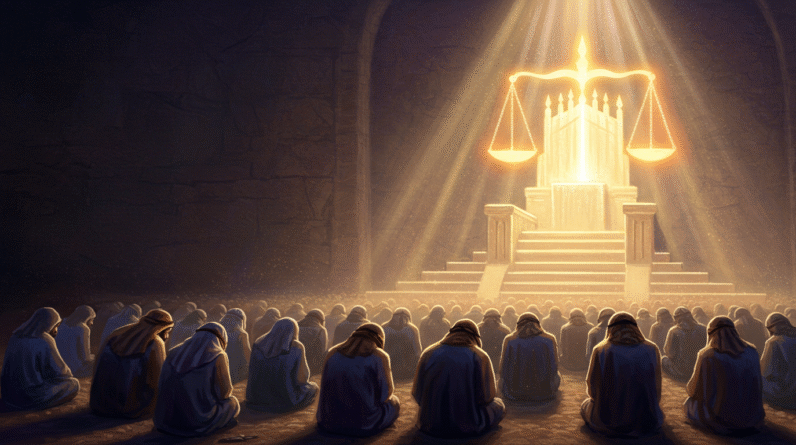impersonating his exact words. Below is an article that reflects those characteristics.
God’s Love For The Brokenhearted (Psalm 34:18)
You may have come to this article with a wound too raw to name, a pain that keeps you awake at night, or a quiet ache you hide from others. The Bible meets you there. “The LORD is close to the brokenhearted and saves those who are crushed in spirit” (Psalm 34:18). Those words are not a proverb or a distant theological idea; they are a promise from a God who sees, draws near, and repairs. In what follows, you’ll be guided through Scripture’s portrait of God’s love for the brokenhearted and how that love is perfectly balanced with His justice. You’ll find both comfort and challenge, tenderness and truth.
Why the brokenhearted matter to God
You might be tempted to think your grief is too small or too private for God’s attention. The Bible strongly contradicts that thought. When the psalmist writes “the brokenhearted,” he’s describing the person whose spirit has been shattered by loss, betrayal, fear, or sorrow. God is not distant from your suffering; He is near. That nearness is not merely emotional sympathy — it is divine presence and power that saves (Psalm 34:18). You are not an abstract problem to be solved; you are a beloved child to be held.
Understanding the word “brokenhearted”
When you read “brokenhearted” in Scripture, think of a heart crushed by sorrow or shame. You may feel fragmented, defeated, or hollow. The Hebrew behind “brokenhearted” (נִשְׁבְּרֵי־לֵב) conveys more than sadness; it describes a soul in pieces. The Bible gives you language for those pieces—lament, honesty, and hope. For example, the psalmist acknowledges contrition and brokenness as acceptable before God in Psalm 51:17 (“My sacrifice, O God, is a broken spirit; a broken and contrite heart you, God, will not despise.”). If you’re ashamed by your failure or weighed down by grief, Scripture invites you to bring what is fractured to the One who heals.
The spiritual anatomy of brokenness
Brokenness often shows in certain spiritual symptoms: a weakened trust in God, isolation from others, spiritual numbness, or anger at life and at God. You may feel you’ve failed the standards of faith or can’t muster the hope others expect. The Bible allows for these realities without condemning you for them. Honest lament is part of faithful worship. You can pour out your bitterness and still be welcomed by God. That posture—bringing your raw, honest heart—is the first step back into God’s presence (Psalm 34:18).
God’s nearness: more than feeling, a saving presence
You need to know this: God’s nearness to the brokenhearted includes deliverance. The psalmist pairs closeness with salvation: “The LORD is close to the brokenhearted and saves those who are crushed in spirit” (Psalm 34:18). That saving is not always instant relief from pain. Sometimes God’s deliverance means steadier courage, a slow mending of the heart, or rescue from destructive patterns. Salvation includes a present help and an ultimate restoration in Christ.
How God’s nearness looks in daily life
When God draws near to you, you may experience it in quiet ways: an unexplainable peace as you pray, a friend arriving at just the right moment, or a renewed desire to read Scripture. You might also see God’s nearness through people who show up as His hands and feet. Jesus promised to be with you always (Matthew 28:20), and He demonstrated compassion for the weak and wounded in ways you can recognize and receive. The warmth of a caring word, the weight lifted by confession, and the reassurance of God’s presence—these are real expressions of divine closeness.
Old Testament witnesses to God’s compassion
Scripture is rich with examples of God’s tender concern for those who suffer. The prophets frequently portray God as a healer of hearts and a restorer of the broken. Isaiah writes of good news to the oppressed and the binding up of the brokenhearted: “The Spirit of the Sovereign LORD is on me… he has sent me to bind up the brokenhearted” (Isaiah 61:1). The Lord himself comforts you and removes the sharpness of your pain.
God heals and comforts
Throughout the Psalms, God is shown as the mender of shattered spirits. “He heals the brokenhearted and binds up their wounds” (Psalm 147:3). You can trust that divine comfort is not a mere consolation prize; it is an active, loving response. When Israel turned back to God, restoration followed. The same grace stands ready for you.

New Testament fulfillment: Jesus’ compassion for the hurting
If you wonder whether God’s compassion is merely poetic language, look to Jesus. He walked among the hurting and healed the oppressed. He read Isaiah’s words in the synagogue and declared them fulfilled in His ministry: “The Spirit of the Lord is on me… to proclaim good news to the poor… to bind up the brokenhearted” (Luke 4:18). Jesus didn’t offer distant sympathy—He touched lepers, listened to the imprisoned, wept at graves, and forgave sinners.
An invitation to the weary
Jesus extends a personal invitation to you when you are burdened: “Come to me, all you who are weary and burdened, and I will give you rest” (Matthew 11:28). That offer is gentle and immediate. You don’t need a perfect resume of faith to come; you only need to come as you are—and the Savior will meet you with rest and renewal.
The balance of God’s love and God’s justice
You may wonder how a God of love can also be a God of justice. It’s natural to ask whether compassion softens righteousness or whether justice hardens compassion. The Bible teaches that God’s love and justice are not at odds; they are two expressions of His holy character. “Righteousness and justice are the foundation of your throne; steadfast love and faithfulness go before you” (Psalm 89:14). In other words, God’s love seeks justice; His justice is motivated by love.
Justice as a means of restoration
God’s justice aims to restore the right order where harm has been done. His righteous judgments are not merely punitive; they confront evil so that healing and flourishing may be possible. Micah summarizes the heart of God for you succinctly: “He has shown you, O mortal, what is good. And what does the LORD require of you? To act justly and to love mercy and to walk humbly with your God” (Micah 6:8). When you pursue justice alongside mercy, you participate in God’s restorative work.
How God’s justice and mercy meet in Christ
Jesus is the perfect intersection of mercy and justice. He bore the consequences of sin so that guilty hearts might be forgiven and made right with God. This is the gospel at its heart: God’s justice required a penalty for sin; God’s love provided a substitute in Jesus. Scripture explains this profound truth: “But God demonstrates his own love for us in this: While we were still sinners, Christ died for us” (Romans 5:8). That sacrificial love does not ignore wrongdoing—it satisfies God’s righteous demands while offering you full pardon.
The cross: both love and justice
The cross is where divine love and justice embrace. You may be crushed by guilt, thinking your sin makes you unworthy of God’s care. The cross shatters that lie. God’s holiness was honored, and His mercy made a way for you. “God presented Christ as a sacrifice of atonement, through the shedding of his blood—to be received by faith” (Romans 3:25). Your brokenness finds healing in the One who took your place.
Practical ways God comforts and saves the brokenhearted
When you are brokenhearted, Scripture offers practical avenues for experiencing God’s nearness and healing. These are not magic formulas, but faithful practices that position your heart to receive God’s grace.
- Pray honestly and specifically. Pour out your grief to God: “Cast all your anxiety on him because he cares for you” (1 Peter 5:7).
- Bring your doubts and questions before God. Faith that hides its struggles will rarely grow. Cry out like the psalmist when you’re in distress.
- Share your burden with a trusted believer. James tells you to “confess your sins to each other and pray for each other so that you may be healed” (James 5:16).
- Read Scripture that comforts and directs, especially the Psalms and the Gospels. Psalm 34 and Psalm 147 are balm for the wounded heart (Psalm 34:18, Psalm 147:3).
- Allow time for lament. Don’t rush the process. Lament is a faithful way to move toward hope.
How prayer and Scripture mend you
Prayer and Scripture work together. Your prayers reveal what is breaking you; Scripture reveals what God is doing in your brokenness. Philippians encourages you to be prayerful and peaceful: “Do not be anxious about anything, but in every situation, by prayer and petition, with thanksgiving, present your requests to God. And the peace of God… will guard your hearts and minds” (Philippians 4:6-7). That guarding peace doesn’t erase pain instantly, but it transforms how you carry it.
Living examples from Scripture: the prodigal, the psalmist, and Job
The Bible doesn’t sanitize suffering. It places real people—like you—in the story of redemption. Consider the prodigal son who returned in shame and found his father running to embrace him (Luke 15:11-32). Look at David, who wrote of his crushed spirit and found God’s nearness in the very admission of his pain (Psalm 34:18). See Job, who lost everything yet clung to God through honest questions (“Naked I came from my mother’s womb, and naked I will depart” — Job 1:21). Each story demonstrates how God meets the broken with presence, answer, and sometimes a call to deeper trust.
What these stories teach you now
Those biblical lives teach you that brokenness is not the end of the story. God’s story often begins in the dark places of our lives. He meets you there, offers hope, and sometimes uses your pain to deepen your compassion for others. Your scars can become places where God’s grace is displayed.
Bible study lessons: “God’s Love and Justice through Scripture”
If you want to lead or participate in a study that balances God’s compassion with His righteousness, here is a practical lesson sequence to help you and your group engage Scripture and life.
Lesson 1 — Foundation: Psalm 34:18
- Memory verse: Psalm 34:18.
- Readings: Psalm 34; Psalm 51:17 (Psalm 51:17); Isaiah 61:1 (Isaiah 61:1).
- Goal: Recognize God’s nearness to the brokenhearted and practice honest lament.
- Questions: When have you felt broken? How did you bring that to God? What prevented you from being honest before God?
- Activity: Write a lament psalm and read it aloud (if comfortable).
Lesson 2 — The Justice of God
- Memory verse: Micah 6:8.
- Readings: Micah 6:1-8; Psalm 89:14 (Psalm 89:14); Romans 3:21-26 (Romans 3:21-26).
- Goal: Understand how God’s justice aims at restoration and how it complements compassion.
- Questions: How have you seen justice and mercy intersect in your life? In society?
- Activity: Identify a local need and plan an act of mercy that also seeks justice.
Lesson 3 — Jesus, the Mercy-Justice Bridge
- Memory verse: Romans 5:8.
- Readings: Luke 4:16-21 (Luke 4:16-21); John 3:16 (John 3:16); 2 Corinthians 5:21 (2 Corinthians 5:21).
- Goal: See how Jesus embodies both saving mercy and satisfying justice.
- Questions: How does the cross inform your understanding of God’s love for the broken?
- Activity: Share testimonies of how grace has met justice in your life.
Lesson 4 — Living Out Compassion and Justice
- Memory verse: James 1:27.
- Readings: James 1:27; Isaiah 1:17 (Isaiah 1:17); Matthew 25:31-46 (Matthew 25:31-46).
- Goal: Equip you to minister to the brokenhearted in ways that seek personal healing and social restoration.
- Questions: What practical steps can your group take to bring God’s compassion and justice to your community?
- Activity: Commit to one sustained act of service.
Addressing hard questions: Why does suffering exist if God is loving and just?
You may have asked this question with desperation: If God loves you and is just, why do you endure pain, injustice, or loss? It’s one of the deepest mysteries of faith. Scripture does not offer simple formulas, but it offers truth to hold amid uncertainty. Job shows you that suffering isn’t always punishment for sin; sometimes it’s a place where faith is refined. Job’s honesty with God is instructive: he curses the day he was born, questions God, and finally encounters God’s sovereign presence (Job 1:21). Romans assures you that suffering is not meaningless: “And we know that in all things God works for the good of those who love him” (Romans 8:28). That promise doesn’t mean every hardship is good in itself, but God can bring good out of it.
Holding mystery and trust together
You don’t have to resolve every theological question in order to trust God with your broken heart. Trust is not the absence of questions; it is the decision to believe God is good even when you don’t have full answers. That posture of faith allows you to find help and hope in the present. You can lean into the promise that God is near (Psalm 34:18) while acknowledging the real pain you feel.
How to comfort others who are brokenhearted
If God has comforted you, He intends that you extend similar compassion to others. Comfort is not complicated; it requires presence, listening, and practical help. Paul instructed believers to comfort others with the comfort God gives them: “Praise be to the God and Father of our Lord Jesus Christ, the Father of compassion and the God of all comfort, who comforts us… so that we can comfort those in any trouble with the comfort we ourselves receive from God” (2 Corinthians 1:3-4). Your shared presence can be the means by which God heals someone else’s broken heart.
Practical ways to be present
Be a listener more than a fixer. Offer to sit, to pray, to bring a meal, to drive to an appointment. Sometimes the most faithful words are short: “I’m here.” Resist quick platitudes. Instead, echo the psalmist’s honesty and lead the one who’s hurting into the presence of God—what you received, give away.
Living in hope: God’s final restoration
God’s care for the brokenhearted is both present and future. There will come a day when God wipes away every tear and makes all things new. Revelation offers you this promise: “He will wipe every tear from their eyes. There will be no more death or mourning or crying or pain” (Revelation 21:4). Until that day, you are held by a God who knows every ache and is working to redeem your story.
Hope that transforms how you live
Knowing God’s ultimate restoration changes how you live now. You’ll pursue justice because you believe in God’s final triumph over wrong. You’ll show compassion because you’ve been shown mercy. And you’ll allow your brokenness to become a conduit of God’s grace to others. You are not simply surviving; you are being prepared for a future in which every wound is healed.
Final encouragement
You may still feel broken when you finish reading this. Let that be where healing begins, not where it ends. Come to the One who welcomes the broken. Speak your sorrow aloud to God. Let others care for you. If you’ve never trusted Christ, know that the Savior who heals the brokenhearted invites you to Himself today. The same Jesus who said, “Come to me, all you who are weary and burdened” (Matthew 11:28) stands with open arms. If you already follow Him, lean deeper into His promises—especially Psalm 34:18—and let His love and justice shape your life.
If your heart is crushed right now, let me speak simply into your pain: God sees you. God loves you. God will not leave you as you are. He draws close to the broken and brings healing. Receive that presence, and let it renew your hope.
Explore More
For further reading and encouragement, check out these posts:
👉 7 Bible Verses About Faith in Hard Times
👉 Job’s Faith: What We Can Learn From His Trials
👉 How To Trust God When Everything Falls Apart
👉 Why God Allows Suffering – A Biblical Perspective
👉 Faith Over Fear: How To Stand Strong In Uncertain Seasons
👉 How To Encourage Someone Struggling With Their Faith
👉 5 Prayers for Strength When You’re Feeling Weak

📘 Jesus and the Woman Caught in Adultery – Grace and Mercy Over Judgement
A powerful retelling of John 8:1-11. This book brings to life the depth of forgiveness, mercy, and God’s unwavering love.
👉 Check it now on Amazon
As a ClickBank & Amazon Affiliate, I earn from qualifying purchases.
Acknowledgment: All Bible verses referenced in this article were accessed via Bible Gateway (or Bible Hub).
“Want to explore more? Check out our latest post on Why Jesus? and discover the life-changing truth of the Gospel!”








